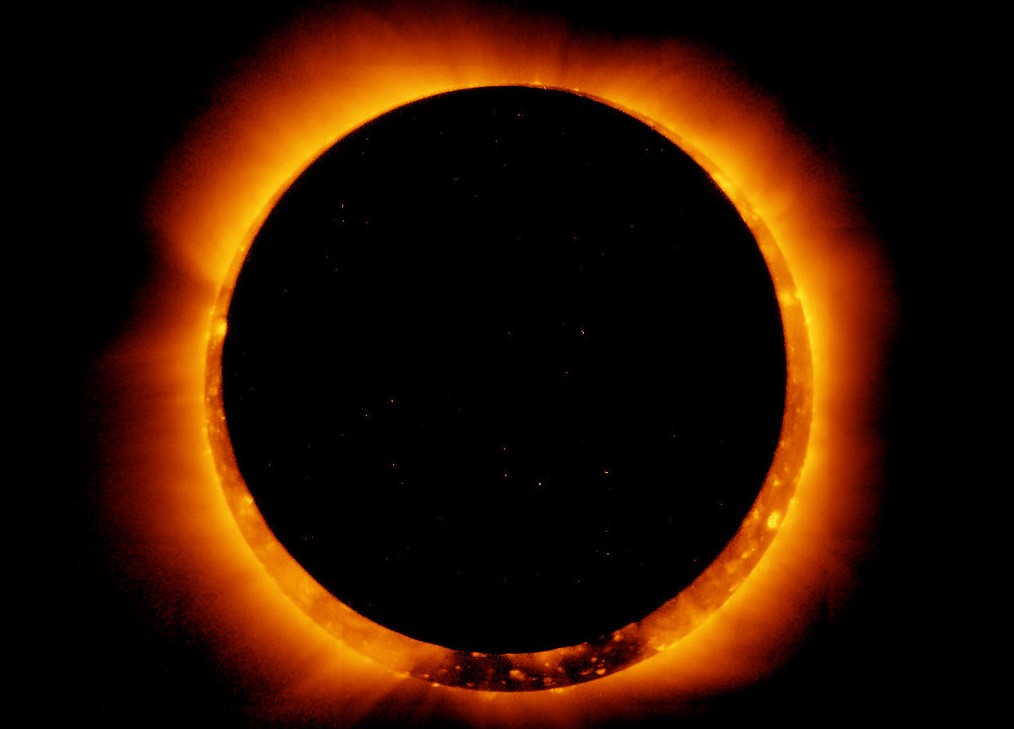Science News Roundup: A million solar eclipse enthusiasts expected at Niagara Falls; Twisted magnetic field observed around Milky Way's central black hole and more
This indicates that strong magnetic fields may be a feature common to black holes, they added. Humans give more viruses to animals than they give us, study finds Some of the deadliest diseases to stalk humankind have come from pathogens that jumped from animals to people.

Following is a summary of current science news briefs.
Scientists chronicle the earliest stages of a supernova
About 20 million years ago, in a galaxy not so far away, a large star exploded and sent elements representing the building blocks of life racing through space. About a year ago, by chance, as the light it emitted reached Earth, a team of scientists in Israel observed it and for the first time collected data on the earliest stages from such an explosion, known as a supernova.
A million solar eclipse enthusiasts expected at Niagara Falls
From vintage train rides costing almost $4,000 per person to hotel rooms listed at $1,600 a night, businesses in and around majestic Niagara Falls are preparing to cash in on the April 8 total solar eclipse - with around a million visitors expected. The dramatic waterfall, situated along the Canadian-U.S. border, is in the path of the eclipse, and many people are splurging on hotels and rentals in advance to experience the phenomenon at one of North America's natural wonders. Demand has pushed up prices of hotels as people making last-minute plans book the last of the available accommodations.
Send robots into space rather than people, says Britain's Astronomer Royal
Britain's Astronomer Royal Martin Rees said sending people into space when robots could do the job just as effectively was a waste of public money, and space exploration should be left to billionaires and those willing to pay for trips themselves. "I'm sceptical about the idea of a human space flight being worthwhile," Rees told the Lord Speaker's Corner podcast, which features members of Britain's upper house of parliament.
Twisted magnetic field observed around Milky Way's central black hole
Astronomers on Wednesday announced that they have detected a strong and organized magnetic field twisted in a spiral pattern around the Milky Way's supermassive black hole, revealing previously unknown qualities of the immensely powerful object lurking at the center of our galaxy. The structure of the magnetic field emanating from the edge of the black hole called Sagittarius A*, or Sgr A*, closely resembles one surrounding the only other black hole ever imaged, a larger one residing at the center of a nearby galaxy called Messier 87, or M87, the researchers said. This indicates that strong magnetic fields may be a feature common to black holes, they added.
Humans give more viruses to animals than they give us, study finds
Some of the deadliest diseases to stalk humankind have come from pathogens that jumped from animals to people. The virus that causes AIDS, for example, crossed over from chimpanzees. And many experts believe the virus that caused the COVID-19 pandemic flowed from bats. But, as a new study shows, this exchange has not been a one-way street. An analysis of all the publicly available viral genome sequences yielded a surprising result: humans give more viruses - about twice as many - to animals than they give to us.
(With inputs from agencies.)
ALSO READ
Watch SpaceX Falcon 9 launch 23 Starlink satellites to low-Earth orbit on Friday
Shell, Friends of the Earth each say European climate ruling backs their view in Dutch case
Earthquake of magnitude 5.5 strikes Tibet, says GFZ
Earthquake of magnitude 6.2 strikes New Britain Region, Papua New Guinea -GFZ
Asteroid 2013 NK4 set to make close flyby of Earth today










